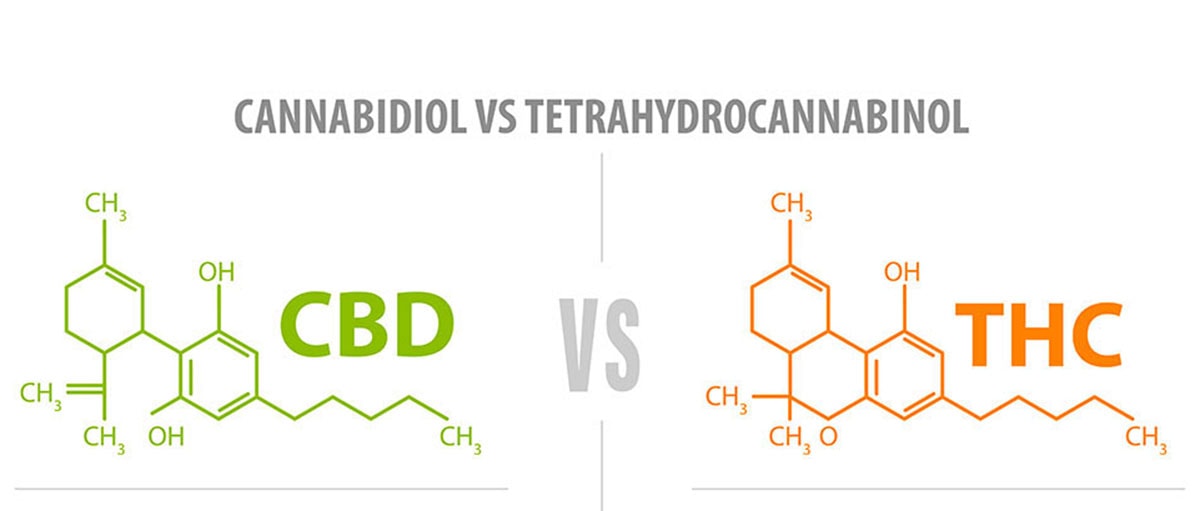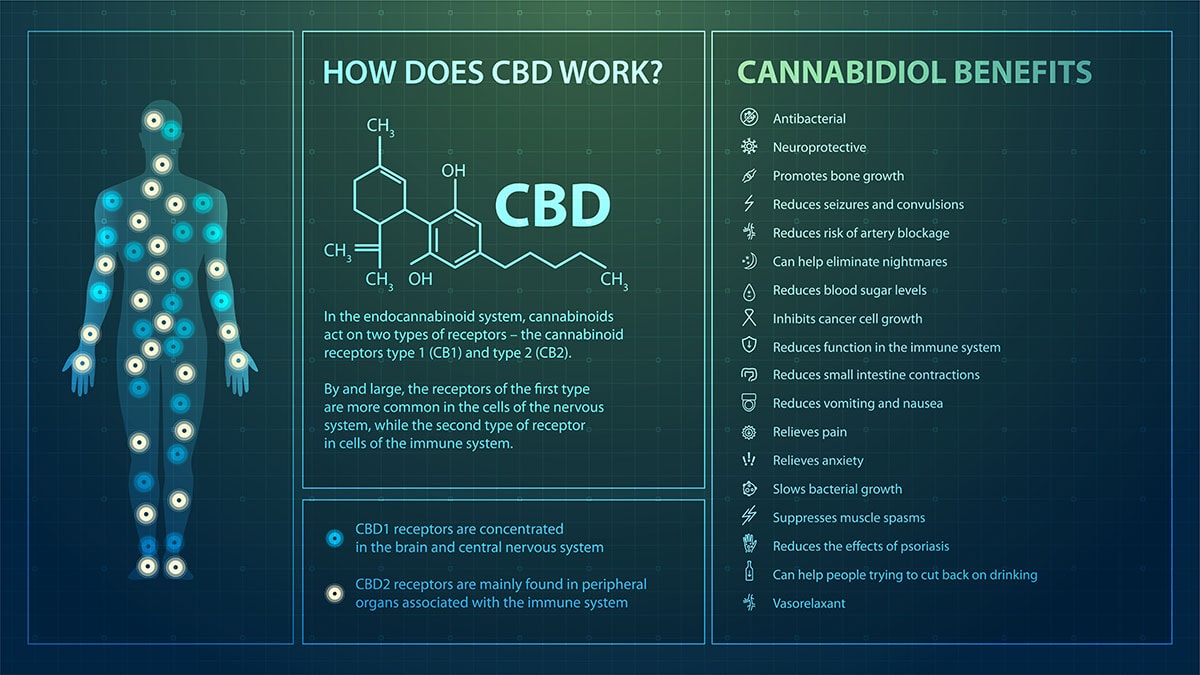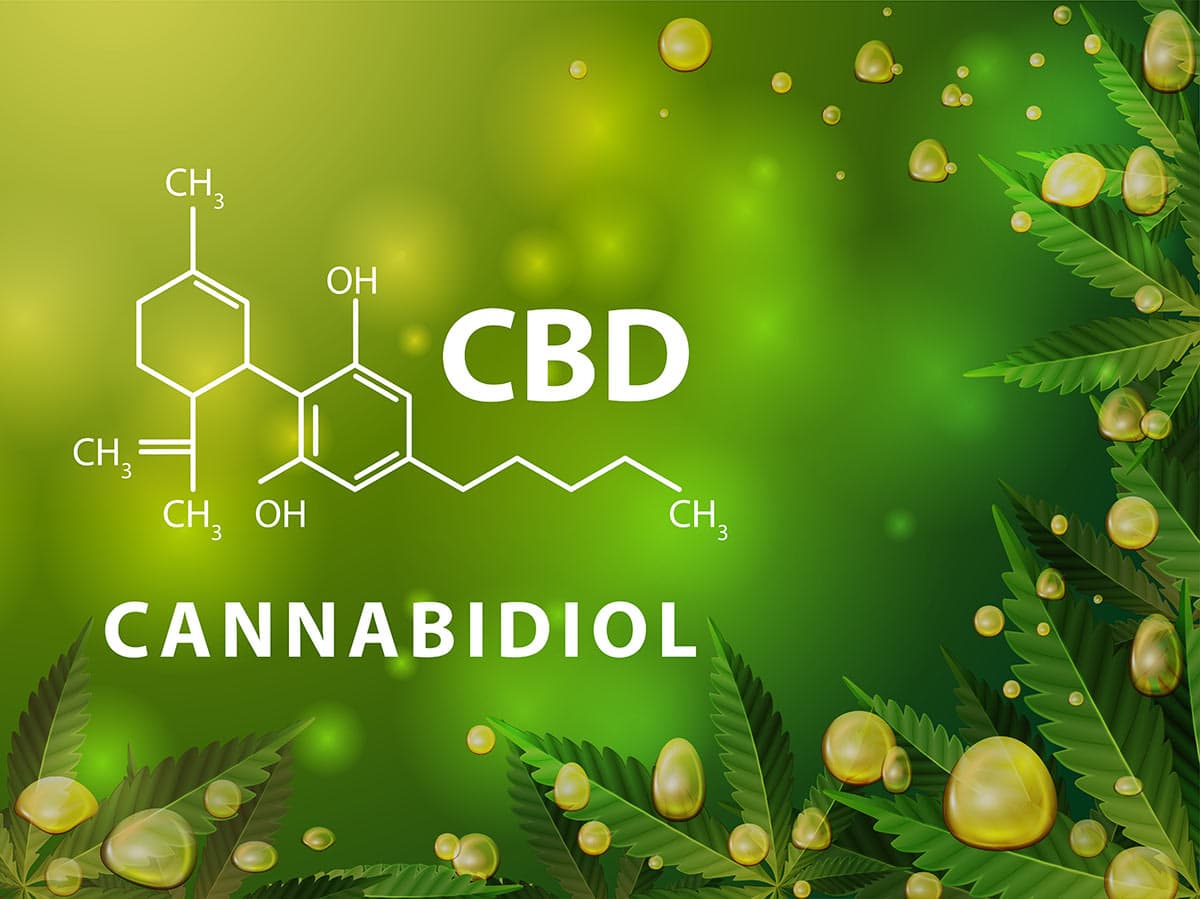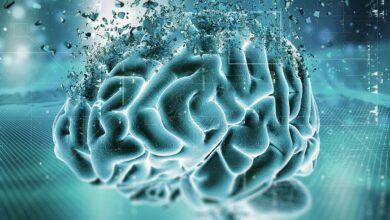Cannabidiol, also known as CBD, is one of around five hundred chemical compounds found in the Cannabis Sativa plant.
These compounds fall into three different categories: flavonoids, terpenes, and cannabinoids.
- Flavonoids: cannabis contains more than 20 different flavonoids. Studies show that the flavonoids in cannabis can reduce inflammation and calm cancer cells and repair damaged neurons.
- Terpenes are the molecules that give plants their aromas and tastes. The terpenes in cannabis have therapeutic benefits just as lavender has a calming effect and basil has an uplifting effect.
- Cannabinoids are the main therapeutic and psychoactive chemical compounds found in cannabis . Of the 113 different cannabinoids, CBD and THC are the best known and most studied.
It is important to understand the difference between CBD and THC:

CBD (cannabidiol)
- Non-psychoactive: does not make you feel drugged or high
- No known side effects
- Can reduce the “high” feeling of THC
THC (tetrahydrocannabinol)
- Psychoactive: makes you feel drugged or high
- Can cause tachycardia and feelings of anxiety
- Useful for muscle spasticity: European licensed drug Sativex
The beneficial properties of CBD make it an appealing option for people wanting to treat pain without the anxiety-inducing side effects of marijuana.
How does CBD work in our bodies?
CBD interacts with the Endocannabinoid System (ECS) to enhance your body’s use of its own natural endocannabinoids
What is the Endocannabinoid System?
The ECS is your body’s monitoring system. Its role is to keep your body’s internal processes in balance regardless of outside influences. We call this ideal balanced state “homeostasis”.
Like the instrument panel in a plane, the ECS continually monitors and adjusts the levels of your hormones, heart rate, body temperature etc. When one of these is too high or too low – if you are really hungry or too hot for example – your body signals the ECS to bring it back into normal range.
In this way, it plays a significant role in how we experience pain, whether acute or chronic. It also regulates immune system response, sleep, hormones, fertility, body temperature and stress management amongst many other things.
Health Benefits of CBD Products
Cannabidiol has shown promise for many different conditions but generally people report feeling calmer and more relaxed. It is particularly great for those suffering from insomnia as it reduces the anxiety associated with sleeping issues. It can also improves both the quantity and quality of sleep.
There are many studies showing the efficacy of both cannabis and CBD for pain relief. Even at low doses it appears to reduce pain but its effects are subtler and gentler than painkillers like ibuprofen or codeine. It uses your body’s own pain-killing system to reduce the sensation of pain.
CBD can also be used as an anti-inflammatory and can help increase mobility in joints. It can also used for other inflammation-based conditions such as osteoarthritis.

Conditions CBD may Help:
Possible health benefits include chronic pain,nerve pain, mental health, anxiety, depression, post traumatic stress disorder, cancer treatment, nausea etc. CBD may also help with cases of addiction to drugs or alcohol as it can help reduce withdrawal symptoms.
One study on people with Alzheimer’s disease found that cannabidiol increased brain activity while slowing down the degenerative process associated with dementia and other age related cognitive disorders
Anxiety
CBD products may also benefit people with other forms of anxiety. These include generalized anxiety disorder, panic disorder, social anxiety and post-traumatic stress disorder (PTSD)
CBD helps reduce anxiety by optimizing the body’s use of dopamine and serotonin, disrupting fear memories and promoting REM sleep.
Depression
Anxiety and depression disorders are the most common mental disorders globally. Depression is characterized by persistent sadness and a loss of interest in normally-enjoyable activities.
In the western world, depression is normally treated with antidepressants, with varying degrees of success. CBD can help by increasing serotonin and dopamine levels in the brain and stimulating neurogenesis (the formation of new neurons).
Schizophrenia
There is much anecdotal evidence to link abuse of THC to schizophrenic episodes. However, there have been several scientific studies showing CBD has antipsychotic properties. It seems it can actually help ease symptoms when used alongside antipsychotic drugs.
Addiction Disorders
A common treatment for opioid addiction is a medication that only temporarily reduces addictive symptoms. CBD, which doesn’t have addictive properties, may provide an alternative substance abuse treatment without risk of dependency.
Taking CBD oil may help but so far, all medically reviewed trials of CBD for addiction have been on animals. No clinical trials have been conducted on humans.
CBD is a promising therapeutic agent for drug addiction treatment. However, before using it to treat this disorder, more scientific studies must be conducted.
Chronic Pain
Although more investigation needs to be done, many studies have shown CBD to be a natural alternative for pain that is not alleviated by opioids.
One review, published in 2018 and encompassing the period 1975 – 2018, showed that CBD is effective at relieving both chronic and acute pain:
- cancer pain
- Neuropathic pain
- fibromyalgia
Multiple Sclerosis
Some research suggests CBD can be used to treat multiple sclerosis, but this requires more study. Cannabis has anti-inflammatory antioxidant and neuroprotective properties.
Concerning multiple sclerosis, CBD works in two ways:
- Suppressing pro-inflammatory cytokines while increasing anti-inflammatory cytokines.
- Activating myelin-derived suppressor cells to decrease the incidence of T-cells.
Mouse lab studies suggest CBD might have the potential to help slow the decline in patients’ conditions allowing use of other treatments. Spasticity from MS could also be treated this way.
Insomnia
People with insomnia experience a variety of sleep challenges. They may have difficulty falling asleep, staying asleep, or achieving a deep restful sleep. There is strong anecdotal evidence that CBD helps alleviate these problems.
Scientists have a few biological explanations for how CBD products may affect both sleep and anxiety. Numerous studies have shown that cannabis compounds interact with receptors throughout the body including in the brain. One of those types of receptors is thought to affect the body’s sleep/wake cycle.
A recent study published in The Permanente Journal found that CBD showed promise for improving short-term sleep problems.

Sexual Issues
The therapeutic effects of CBD can also be beneficial in the bedroom as there are many cannabinoid receptors in your reproductive organs and sexual tissue.
CBD can reduce anxiety levels and help you feel more relaxed, leaving you more able to focus on pleasure and arousal.
When applied topically, CBD oil may help relax blood vessels to increase circulation to enhance arousal, sensitivity, and lubrication. Using a lubricant that contains CBD can improve sexual performance and relieve pain if you struggle with dryness and painful sex.
In fact, CBD is uniquely capable of addressing every concern that stands in your way, whether it is stress, anxiety, dryness, or discomfort.
And by relaxing muscles, easing tension, and managing pain, CBD oil could be a game-changer for postpartum parents.
Epilepsy
Epilepsy is a chronic disorder that causes seizures, periods of unusual behaviour, sensations, and sometimes loss of awareness. Seizures are marked by abnormal electrical activity in the brain.
CBD has shown promise for many health benefits, but so far, the most substantial scientific evidence is its effectiveness in treating children with rare forms of severe epilepsy disorders.
In Europe, the CBD based pharmaceutical drug Epidiolex is licensed for treatment of Lennox-Gastaut syndrome, Dravet syndrome and Tuberous Sclerosis Complex and results are impressive with up to 50% reduction in seizures.
Cancer treatment
A growing number of clinical trials have been looking at how cannabinoids can reduce tumour growth in animal models. CBD appears to increase the potency or uptake when it is taken with certain cancer-treating drugs.
- A 2019 review of in vitro and in vivo studies on the effects of cannabinoids on pancreatic cancer found that they can slow tumour growth, reduce invasion, and induce cell death.
Fibromyalgia
Fibromyalgia is a musculoskeletal pain condition that can lead to fatigue, sleep, memory and mood problems. Experts believe this disorder affects your brain’s senses by amplifying painful sensations.
A 2016 study suggests that CBD may have beneficial effects on treating chronic pain syndromes, including migraines and fibromyalgia, which may result from a lack of endocannabinoids.
CBD’s success in alleviating this pain may be attributable to correcting this deficiency of endocannabinoids.
Arthritis
Arthritis is a condition characterized by swelling, inflammation and stiffness of the joints. The most common type is osteoarthritis which can lead to pain during movement.
Animal studies show the benefits of CBD in relieving pain and its anti-inflammatory properties, but human studies have not yet validated these benefits.
Many arthritis sufferers who have tried CBD report noticeable relief from pain, sleep improvement or reductions in anxiety, but so far these results are largely anecdotal.

Digestive issues: GORD (GERD) and acid reflux
Sufferers of acid reflux, heartburn and GORD may find relief from CBD. Many peer reviewed studies have found that those who take CBD products experience less symptoms such as a burning sensation in the stomach, chest and throat, bloatedness, difficulty swallowing and vomiting .
A 2019 study concluded that CBD can help with Irritable bowel syndrome (IBS), leaky gut syndrome and some other gut-based issues by reducing permeability in the gut.
Side effects
CBD is different from smoking a joint. It won’t make you giggly or hungry. The most common side effect is drowsiness, so to begin with it’s best not to take it before a long drive or a big presentation.
If you are thinking about taking CBD, start with a low dosage and see how your body reacts. In some rare cases, CBD oil can make heartburn worse.
CBD products have a few potential side effects. Still, for people with conditions like anxiety or epilepsy, these are much milder than those from traditional medical treatments.
Some of the potential side effects of CBD are:
- Diarrhea
- Changes in appetite and body weight
- Fatigue
Dosage and preparation
There is no set “right” dose of CBD oil. It depends on the individual and what they are treating. Many people find relief with as little as 5mg a day whilst others take up to 300mg daily. As it works by stimulating the body’s own ECS system, results and reactions vary widely depending on your personal physiology. The best idea is to start low, and work up.
FAQ
Is CBD oil legal?
Though CBD is legal in a majority of European countries, there are some exceptions.
The EU regards CBD as a novel food and thus limits access to CBD products. Currently, regulators are discussing changing these restrictions due to the emerging benefits of CBD oil.
Possessing cannabis or hemp plants for medical use is illegal, unless provided by a medical specialist or by special license.
It is important to check federal, state, and international laws before travelling with CBD oil.
Will it make me high?
The short answer is NO. CBD is a non-psychoactive substance, meaning it doesn’t have the same effects as THC (the psychoactive ingredient in marijuana).
CBD does not produce any kind of high or euphoria. It is a naturally occurring substance, and its chemical compounds are inert and harmless to healthy cells within our bodies. This makes them safe for consumption by all ages without risk of addiction. CBD also has very few adverse side effects when taken at appropriate dosages.
It’s vital that you discuss your CBD usage with a healthcare provider.
Can it help me?
Yes, it probably can! Cannabis is a natural medicine that has been used for centuries. The health benefits of CBD are being shown time and again in studies.
It is non-toxic and reacts with very few other medications. Be careful of medicines that carry a “grapefruit” warning, such as high blood pressure medications. Cannabis also has blood pressure-lowering properties.
CBD may help relieve anxiety, depression or PTSD because of its calming and sedative effects on the brain. CBD oil is useful in treating seizures as well. It can abe used for pain management against inflammatory and neuropathic pain. Also for the muscle spasms, cramps, and tremors caused by illnesses such as MS, IBS and GORD amongst others.
The conclusion
Medical cannabis is a natural remedy that has been used for centuries for ailments such as pain, anxiety and epilepsy.
Whilst further research needs to be done, it is clear that CBD is worth a try – particularly if you’re looking for an alternative treatment or medication with fewer side effects than your current pharmaceuticals. It may help relieve any pain or discomfort you may be experiencing.
If you do find that CBD works well for you, please share your experience below so others can benefit too!
READ MORE







